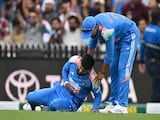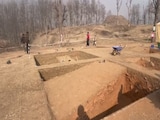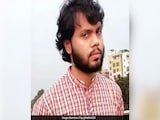The Supreme Court today gave its judgement, ordering a formal mediation in the Ayodhya case, as a roadmap to solve the 60-year-old Ram Janmabhoomi-Babri Masjid dispute. A five-judge bench led by Chief Justice of India Ranjan Gogoi said the case was not about property, but about "mind, heart and healing-if possible." While the Supreme Court is in favour of mediation in the case, most parties involved do not approve of mediation.
The Supreme Court has formed a three-member panel to meet all the petitioners in the Ayodhya dispute case. The three-member mediation committee will include former Supreme Court judge Justice FM ibrahim Kalifulla, 68, senior advocate Sriram Panchu, 69 and Sri Sri Ravi Shankar, 62. Justice Kalifulla would be the chairperson of the committee. The mediators can induct more members in the committee, the Supreme Court said.
"Mediation will take place. We don't see any legal obstruction to it," said Chief Justice Ranjan Gogoi while delivering the order. "Mediation proceedings will remain confidential. There would be no reporting in any media," he added.
During the last hearing on Wednesday, most of the Hindu petitioners, the Uttar Pradesh government and the consul of "Ram Lalla", the deity infant Lord Ram, had shown reluctance towards mediation. The Sunni Waqf Board, ready to give mediation a shot, is concerned about privacy during negotiations. The Nirmohi Akhara, another petitioner in the case, has also agreed for mediation.
The Constitution Bench, which is hearing the case, said mediation may help in "healing relations". Even if there is "one per cent chance" of settling the dispute amicably, the parties should go for mediation, the bench had said.
Two years ago, the court had suggested that the two sides explore the possibility of resolving the matter through negotiation. The court even said it was ready to mediate if they agreed. But negotiations did not take off as all sides involved said they wanted the court to take a call.
Here are the Highlights on the Supreme Court order on mediation in the Ayodhya Ram Mandir Case:
"I will do my best," he added.
"He has given an on record statement threatening violence. The other mediators don't have on record statements," he said.
"On 4 November 2018, there's a statement he has given. He threatened violence. How will he stay neutral? 'If muslims don't give up their claim on Ayodhya, India will become Syria.' He hopes everyone will forget what he said," said Asaduddin Owaisi.
"Supreme Court is free to appoint whoever it wants," he added.
"I'm yet to received order copy.I can say if committee has been constituted we'll take every effort to resolve the issue amicably," he said.
"Hon'ble Court looking for "a possibility of healing relationships" is an appreciable move. BSP welcomes it," she said in the tweet.
The Supreme Court today ordered mediation to settle the Ram Janmabhoomi-Babri Masjid dispute by a three-member panel including Justice Kalifulla, Sri Sri Ravishankar and Sriram Panchu. The panel has been given eight weeks by the Supreme Court to arrive at a conclusion and four weeks to give a status report. The three members, however, have the liberty to get more people on board if they want, said the top court.
The decades-old Ram Janmabhoomi dispute will be settled through mediation, the Supreme Court said today. Former Supreme Court judge, Justice Ibrahim Khalifulla, will head the three-member mediation committee, which will meet all the petitioners in Faizabad.
Mr Panchu has mediated a large number of complex and high-value disputes across the range of commercial, corporate and contractual disputes in different parts of India.
These include construction and property development, insolvency and winding up, property disputes, family business conflict, intellectual property and information technology disputes. He has also mediated international commercial disputes.
He is a certified mediator on the panel of the Singapore International Mediation Centre. He was appointed by the Supreme Court to mediate a 500 square kilometre dispute between the states of Assam and Nagaland, and another public dispute involving the Parsi community in Bombay.
He is at ease with the facilitative and evaluative styles of mediation. He also combines mediation and arbitration, and has developed innovative methods that are user-friendly and ensure finality of result with the best possible solution.
He has authored two books on mediation. Settle for More introduced mediation to the Indian audience. Mediation: Practice & Law (Butterworths, LexisNexis) is the standard manual in India. He has authored the Indian chapter of Getting the Deal Through.
The Supreme Court of India has referred to him as a "distinguished mediator", "eminent trainer" and "one of the foremost mediators in the country".
He was an active Labour Law Practitioner as Partner of the Lawyer's Firm called M/s TS Gopalan & Co, and appeared for various Public and Private Sector Undertakings, Nationalised and Scheduled Banks. He was the Standing Counsel for the Tamil Nadu Electricity Board. On 2nd March, 2000, he was appointed as Permanent Judge of the Madras High Court.
"It is not only about property. It is about mind, heart and healing, if possible," said a bench headed by Chief Justice Ranjan Gogoi which reserved its decision on referring the case to a court-appointed mediator.
A five judge constitution bench will decide today whether the Ram temple issue that has been pending in courts for 60 years, can be solved by mediation.
The Ram Janmabhoomi-Babri Masjid dispute is not an issue of land but one of "sentiment and faith", the Supreme Court said today as it heard the response of various petitioners to its suggestion that mediation should be considered.
Chief Justice Ranjan Gogoi before hearing the Ayodhya and Rafale cases today said the country needs a lot of things but sadly, we have limited time.
A five judge constitution bench will decide today whether the Ram temple issue that has been pending in courts for 60 years, can be solved by mediation.















